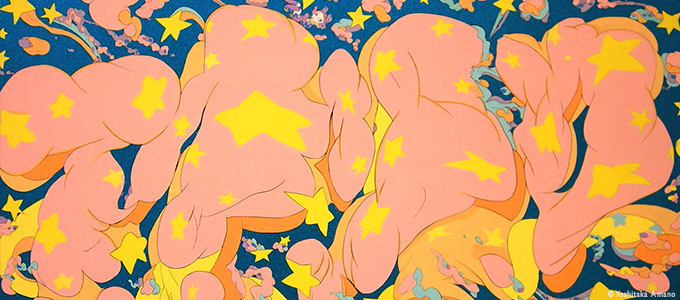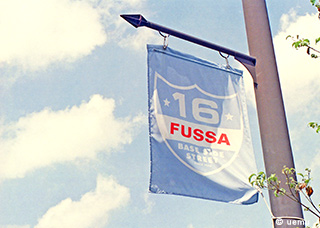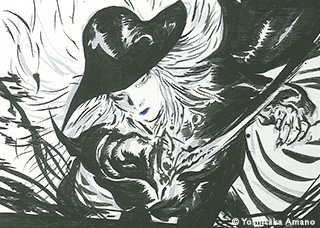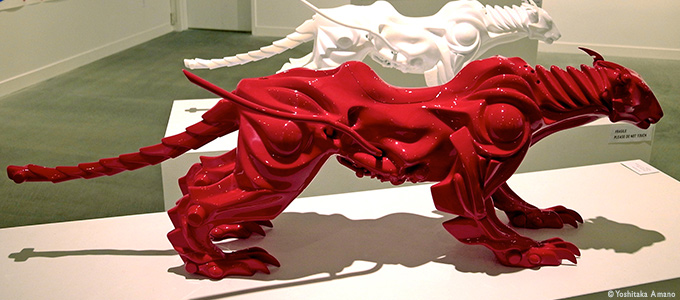
Imperfect Lovers
“America,” to Artist Yoshitaka Amano is almost like his very first love. Further, it is an ever-lasting first love that will never be fulfilled. When talking about the impact American culture had on him, like most post-war born Japanese artists, Artist Amano’s expression changes as if we were reminded of a distant memory of love.
“A while after I moved to Tokyo and when I was around 22, I was living in Fussa where the Yokota U.S. military base is located. It was in the mid-70’s and it was the era when American pop culture was super fun. All kinds of people who were turned on by it had gathered in that area and it was a total hoot. Like rock and roll musicians and a bunch of young people living in a shared room. I had a whole house to myself. The rent cost half of my monthly earnings of that time.”
“In Fussa back then, there were housings called ‘foreigner homes,’ and only stationed army folks were allowed to live there. But eventually there were a lot of vacancies, so it started opening up to the Japanese as well. I was curious, and so I moved into one of them. I found American-made household appliances that were left behind by soldiers who had gone back home. There were always fighter jets flying over and it was so noisy, but it was fun to be there.”

“I was totally crazy about America. (laugh) It was during the Vietnam War, so there were anti-war movements, too, but I myself never felt the anti-American sentiment in general. There were American clothing stores, pizza shops, and steak houses all along the Route 16 and it didn’t seem like Japan. It was a place I could have a pseudo experience of America.”
Artist Amano finally got to visit the America of his dreams after he was 30 years old for an animation job that he had to go to Los Angeles for.
“The America I knew from Fussa was, after all, a mock representation of the real thing. I even thought that people would understand Japanese when I got to the U.S. I really didn’t have the slightest clue about it. (laugh) I went with an older colleague and neither of us spoke English. For example, we were wondering how to say ‘cigarette’ in English. But I was so happy because American culture was rare and precious to us back then way more than these days. The only thing was the jetlag. It was so intense and I remember being completely out of it for the important meeting that we came all the way for. It was unproductive.“
“The second time I went to the U.S. was as a guest to the World Fantasy Convention of 1989 in Seattle. I was invited as an illustrator – I wasn’t very associated with animation. There were all kinds of American fantasy novelists there like Ursula K. Le Guin of the ‘Tales from Earthsea.’ I remember that visit to Seattle much more.”
“Looking back, what attracted me to American culture was in fact pop culture like Disney and comic books. There was only one bookstore that carried American comic books and it was in Kanda, so I used to go there a lot. I couldn’t read English, so I would just look at the pictures. (laugh) There was also the new wave of pop art like Andy Warhol and Peter Max coming in. I was impacted by the psychedelic movement, too.”

Japan was becoming a consumer market in a time of rapid economic growth and was absorbing all the American culture that was gushing in as if a blockage had been removed. Eventually all the consumption of the imported culture had come to full circle, and this time Japan was ready to create its own expression by revising what it had learned. Artist Amano states that it is the love and curiosity for foreign cultures by youth of that era that made today’s Japanese pop culture.
“Nowadays, you feel like you know everything without going anywhere. People feel like they have gone somewhere by surfing the internet. But that is, however, filtered information of another person. No matter how far you go with that, it is still virtual information and it is no match to the impression you would get first hand. You heard ‘that restaurant in NY is really good,’ and so you look that up. That is no use. That is someone else’s opinion. But the masses will easily accept that. Imitating someone else’s life is a scary thing.”
“When I first went to New York, and this is a bit silly, but I had been watching The French Connection and Midnight Cowboy, and was freaked out by how scary New York seemed, but of course it turned out that the films and the actual city were totally different. The tonality was different. The color of the city and the graffiti, the things I never could have imagined started to reveal themselves and I was surprised by it. Even if going out was a hassle, I needed to go out there. That is how I felt.”
“Ever since I was a kid, I enjoyed looking at the world map or the globe and imagining visiting the places I had seen on TV or film. But actually taking a trip to those places is a whole different story. Staying in hotels makes me uneasy, but I still have to do it. It is a similar feeling when I had to move to Tokyo from my hometown. I really didn’t want to go, but I just had to. If I don’t go out there to get stimulated, then no new imagination will come from it.”
Even today, Artist Amano often gets inspiration from products and fashion items from the U.S. and Europe. He also loves automobiles. But rather than driving them, he is more interested in the structure of them.
“I am driving a BMW now, but as a form, the Ferrari is much better looking. It feels like perfection to me. I can see that the designer goes after aesthetic beauty without hesitation. I also like the classic American cars that are bulky and tough looking. The trucks and jeeps were designed for ultimate utility.”
“Whether it’s a car or anything else, one should seek out what is beautiful to set one’s own standard for beauty. If we were looking for everyone’s average of trying to find the common denominator, then we would only come up with average stuff. There is no such thing in this world as a perfect thing that every single person wants. And if so, what a boring world. We humans are beings that are in continual pursuit. There are eras when simplicity is pursued, and then eventually people will frantically pursue the opposite value. That is how we keep revolving.”
“What I am interested in these days is a world of organisms where there is no distinguishing from machine to man. The machines are becoming more human, because human beings can’t evolve any further. In some ways, though, we have managed to degenerate. If we kept evolving and became perfect, we would meet our extinction right away. All perfect things must perish. So on that note, I think this world and humankind won’t be going anywhere for a while.”
Because humans will never be perfect, we continue to strive. Because we try to be complete, sometimes we collide and become warped. Ahead on the road of our pursuits are encounters with new imperfections. Until the day comes when the imperfect human existence meets another imperfect existence to become a flawless completion, until that day, we will continue to be in love with our ever-lasting first love.
(Interview: Manami Iiboshi, Translation: Mika Anami)
